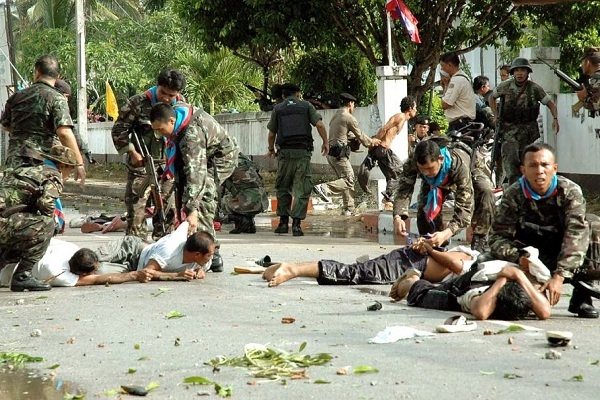Thai PM Apologizes for 2004 Tak Bai Massacre of 85 Muslims

“I am deeply saddened for what happened and apologize on behalf of the government,” Shinawatra said, Reuters reported. The massacre occurred during the administration of her father, Thaksin Shinawatra, a prominent figure in the ruling Pheu Thai Party.
The 2004 security crackdown in Tak Bai, a southern town, was a significant event in the separatist insurgency that reignited that year and has since claimed over 7,600 lives. The "Tak Bai massacre" drew international attention and condemnation.
The incident began when security forces opened fire on a crowd protesting outside a police station in Narathiwat, a Muslim-majority province. Seven people were killed by gunfire, and 78 others suffocated after being arrested and stacked on top of each other in military trucks, face down with their hands tied behind their backs.
Efforts to prosecute those responsible have repeatedly failed. In August, a court accepted a lawsuit by victims’ families against seven senior officials, including a retired general and a ruling party lawmaker, but none appeared at the hearing.
A separate case against eight other personnel filed by the attorney-general last month has also stalled. The defendants missed their final court date last week, increasing the likelihood they will never face justice. The court has scheduled the next hearing for October 28, after which the proceedings are expected to be dismissed.
Paetongtarn Shinawatra emphasized that the incident should not be politicized and stated that extending the statute of limitations would breach the constitution. Thai police have issued Interpol red notices and are actively tracking all 14 suspects.
“Although the case is expiring, history and memories do not,” said Ratsada Manooratsada, a lawyer for the victims’ families. “(The families) will never forget because the perpetrators were not brought to justice.”
In Geneva, UN rights experts expressed extreme concern that no one would be held accountable. In a joint statement, they said they were “extremely alarmed that without further action,” the cases “will end prematurely when a statute of limitations expires.”
They added, “Failure to investigate and bring perpetrators to justice is itself a violation of Thailand’s human rights obligations. International law also prohibits statutes of limitations for torture and other forms of ill-treatment.”
The UN experts urged the Thai government “to prevent further delays in accountability and ensure their rights to truth, justice, and reparations are upheld.” They also called for further investigations into the fate of seven people who disappeared during the incident.
Source: Agencies



